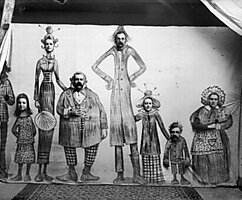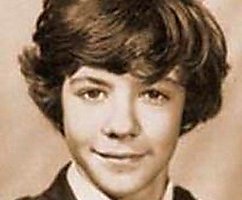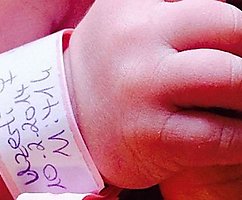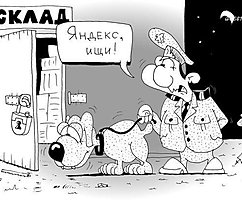Education as a way of liberation: lessons Babinskoe school
 Bashny.Net
Bashny.Net
At the end of the sixties best-seller in Italy was the book written by students in a tiny rural school, situated to the North of Florence. This book was called "a Letter to the teacher", its authors were the eight children who had not yet emerged from adolescence. She was a lively and scathing critique of the education system, which continues to be the subject of considerable debate and an occasion for intense reflection.
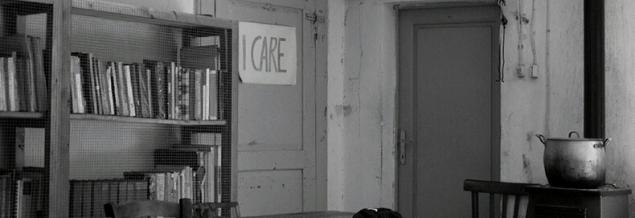
This criticism was heard and a statement of the ideal, "as it should be." Education should foster independent thinking, should be taught self-reliance, and the ability to articulate their thoughts and to be critical of any stereotypes.
School should be a tool to achieve freedom.
This ideal, the authors saw in their own school, which was led by Lorenzo Milani, a Catholic priest and teacher who loved "his disciples and the congregation larger than the Church and the Pope". Lorenzo was a native of upper class Italian society, but decided to devote his life to the struggle for equality and equal rights. In this he saw the main goal of pedagogy.

Postage stamp with the image Babinskoe schools, released in 2015. Source: delcampe.net
His school, which worked Barbiana from 1954 to 1967, is today considered one of the most important projects of critical pedagogy, along with educational initiatives Paulo Freire (author of the famous "Pedagogy of the oppressed"). Remembering how it all began, Milani wrote:
I serve in a rural parish. When I arrived there, there was only an elementary school. Five classes worked in the same room. The children came from semi-literate fifth grade and went to work. They were timid, despised. It was then that I decided that the life of a village priest I dedicate not only their spiritual but also civil elevation.
Lorenzo Milani
in "Letter to judges"
In Barbiana, as well as throughout the County, lived mostly peasants and factory workers, a lifetime engaged in heavy physical labor. Of course, they wanted to provide their children with a good education, because "the school will always be better than cow shit", but in fact this possibility was they not always. Eight years of education in Italy is free and compulsory, but students are often expelled from school for academic failure or dropping in the second year.
The training was very far from the real life of the rural child. Some could not cope with the demands, others have accepted the standards imposed from above and achieved success. In "Letter..." and they both called "crippled". The first is back to the monotonous mind-numbing work, the second rushed to the privileges of the upper classes. But neither one nor the other have not learned to think.
The children had to go to Milani from afar: in the district it was the only school, after which it was possible to do in secondary and higher educational institutions. The classes lasted for twelve hours — the whole day without breaks and weekends. Some were amazed at this level of loading. But the disciples remembered that it was not anything terrible. The educational process was organized in such a way as not to bore anyone beyond measure.
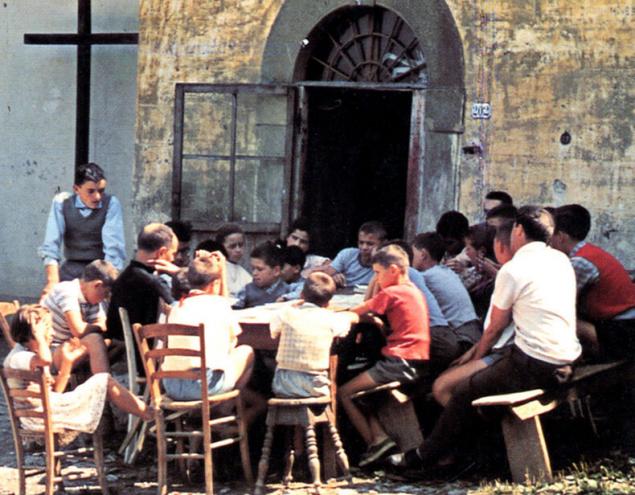
One of the few color photos Babinskoe school. 1960 Source: bdp.it
Classes began at eight in the morning and ended in the evening. The students were divided into two groups: in the morning the older taught the younger and shared with each other their knowledge. This was an important pedagogical point: the children immediately began to realize that they share common problems and interests. Together they can deal with them much faster and easier than alone.
In "Letter to the teacher" says it this way:
The next year I became a teacher. Rather, I was a teacher for three half days a week. To flip through an Atlas or explain fractions do not necessarily have higher education. Strange we watched it together in the books. The lessons were in peace, without fear, without coercion. You can't teach the way I do.
Girls in school almost was not: in the surrounding villages they were born smaller than boys. Besides, according to the beliefs of many parents, girls learn not necessarily. As stated in the "Letter", "they believe that a woman can live life and harebrained".
In addition to the standard items an essential part of the learning process was reading the letters that came to the school and Newspapers. Milani believed that every child must first understand how things work in the present, what laws govern his life. Therefore, the main subject of discussion was often politics is a topic that is avoided in the modern school.
Sometimes in Barbiano guests arrived. If the visitor could learn something guys and share interesting reasoning, the classes were interrupted. In the discussion, often participated and children. Milani knew very well how limited the contacts of local inhabitants with the outside world, and how it imprisons them.
So it was impossible to miss a single opportunity to show students that the world is not limited to cows, life and hard work in the field.
Some of the time students worked independently. Intellectual training was combined with exercise (in the summer — swimming and in winter skiing), although the sport Milani considered as a whole pointless and stupid. In this he was radically different from the priests and teachers in neighboring schools and parishes that attracted students, arranging football matches and buying televisions.
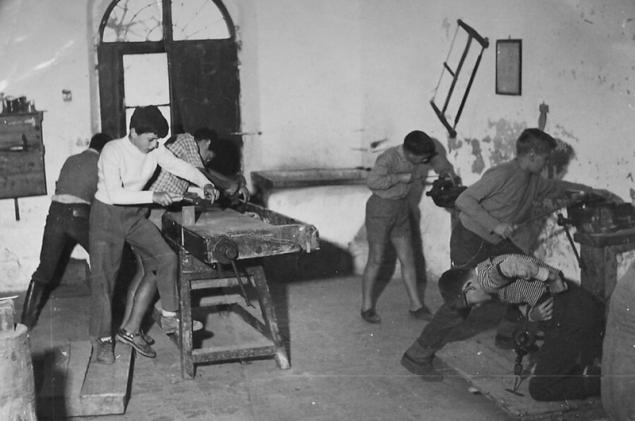
The school does not receive government funding. Chairs, tables, shelves, tools and even tutorials made by the students. Source: donlorenzomilani.it
As he wrote to Milani, Barbiana was not similar to a typical school. Students freely walked around the class; all of the characters of the teachers of government Department, Board, table with an open journal, were driven away. Going to school, "inattentive visitor will see the room, a few tables, a few children sitting here and there in books; sometimes they gather around a priest who collapsed in the chair, and because the visitor <...> it seems that he was not in school, and in some living room".
Classes were 365 days in a year, even on Sundays and holidays. Nearly all of Sunday was devoted to a meticulous reading of the gospel, which is considered from various sides and dismantled to the smallest detail. Although Milani was a priest, he did not seek to convert students to Catholicism. Set an example — perhaps, but not to haul in their faith by force. This would be contrary to all his principles.
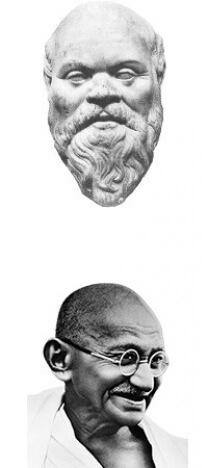
The main cultural heroes of barbiana was Socrates and Gandhi. Source: wikipedia.org
Great importance was given to the study of foreign languages. Not dead Latin, which still had to teach many professions (including teachers), and the living languages you can speak and read that you can hear on the radio. Another language — this is another opportunity to break the vicious world and remember that we are not alone. We can understand each other and help each other regardless of state and national boundaries.
After high school, many students for several months has traveled to other countries. In fact, it was a real exam — a test of character and abilities. The main condition of a trip in another country they had had to study and find work.
The main subject of criticism in the "Letter to the teacher" was class oppression, which is reinforced by traditional education system.
Two characters who appear in it are representatives of different cultural worlds. Pierino — the son of the doctor whom learning is easy, because his whole life passes in the appropriate setting. Gianni is the son of a farmer who faces school exclusion and indifference. He can't get ahead, despite all their efforts. From it don't.
"A letter..." was born as a protest against injustice. The poor thrown out of school for academic failure, instead of trying to convey to them the values and ideas of education, while the rich benefit and easy advance. This difference is not innate. It is social injustice that can and should be eliminated.
This criticism found its recipient. In a letter to the authors of the book, one school teacher wrote:
It is you I owe the fact that in the last days of the lessons I new eyes looking at the weakest and most hopeless students, and even not ashamed to say it — I feel for them hitherto unprecedented tenderness.
Preparing "Letters to the teacher" itself was an educational process. Even those who were weak in mathematics, working with complex statistical data to back up their assertions. Even those who lacked confidence felt in his ability and desire to do something really important.
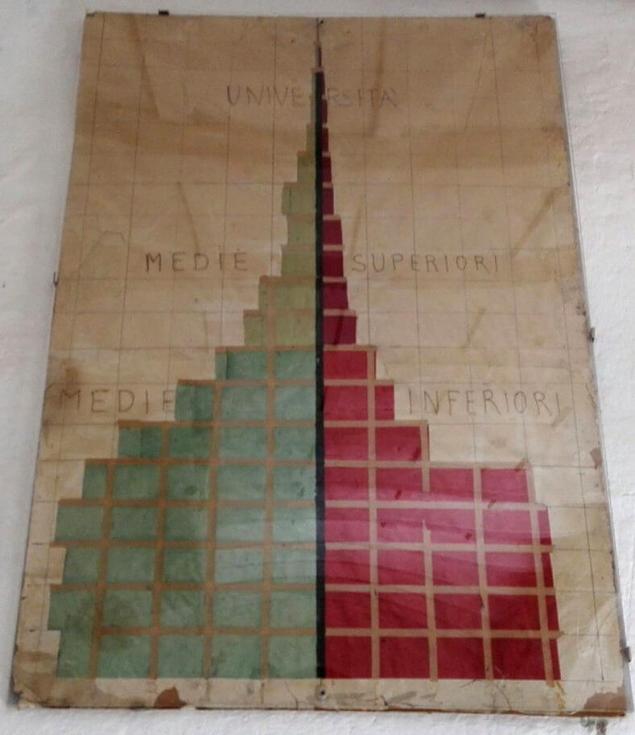
In the book a lot of graphs and tables, data for which students sought and treated themselves. This pyramid reflects the fact, as the declining number of students from Junior school to University. Source: quasicomedonchisciotte.blogspot.ru
On one of the doors of the school hung unspoken motto and slogan of Babintsev: I care (I care). Anyone can change the world for the better, having the right knowledge and a critical mind. Pedagogy Milani was directed against inequality and oppression. We need to fight them not with political slogans, and the growth of consciousness, to improve the "level of understanding of reality."
Four principles Babinskoe school
Also believed and his disciples that can be seen in a characteristic passage from "Letters": "... if the choice is between indifferent and obsessed teacher, obsessed better. Someone who has their own opinion and favorite philosopher. He tells us only about this one, let scolds all others, even three years in a row with us just reads his lyrics. We will leave school with the conviction that philosophy can fill someone's life".
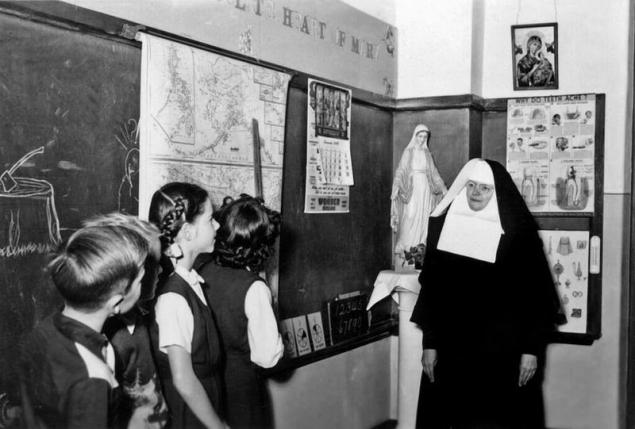
The usual Catholic school was very different from Barbiani. Source: yabberz.com
20 phrases that should NOT tell a mother her adult daughtersParenting boys is not a woman's occupation
Lorenzo Milani died of lymphoma shortly after the publication of "Letters to the teacher". For his life almost nothing written. He abandoned this occupation when he realized that most of his countrymen will not be able to read and understand his thoughts. Instead, he made the main business of his life learning the ability to think.
School Milani was preparing the disciples for the difficulties and contradictions of the real world. And that means not a narrow specialization and the ability to earn money. This means the ability to take responsibility for themselves and their actions, to have their own opinion, not rely on the power of the authority and keep the desire to change the world for the better. No matter how loudly it may sound, all these are achievable goals.published
Author: Oleg Bocharnikov
Source: newtonew.com/discussions/barbiana-school-critical-pedagogy

This criticism was heard and a statement of the ideal, "as it should be." Education should foster independent thinking, should be taught self-reliance, and the ability to articulate their thoughts and to be critical of any stereotypes.
School should be a tool to achieve freedom.
This ideal, the authors saw in their own school, which was led by Lorenzo Milani, a Catholic priest and teacher who loved "his disciples and the congregation larger than the Church and the Pope". Lorenzo was a native of upper class Italian society, but decided to devote his life to the struggle for equality and equal rights. In this he saw the main goal of pedagogy.

Postage stamp with the image Babinskoe schools, released in 2015. Source: delcampe.net
His school, which worked Barbiana from 1954 to 1967, is today considered one of the most important projects of critical pedagogy, along with educational initiatives Paulo Freire (author of the famous "Pedagogy of the oppressed"). Remembering how it all began, Milani wrote:
I serve in a rural parish. When I arrived there, there was only an elementary school. Five classes worked in the same room. The children came from semi-literate fifth grade and went to work. They were timid, despised. It was then that I decided that the life of a village priest I dedicate not only their spiritual but also civil elevation.
Lorenzo Milani
in "Letter to judges"
In Barbiana, as well as throughout the County, lived mostly peasants and factory workers, a lifetime engaged in heavy physical labor. Of course, they wanted to provide their children with a good education, because "the school will always be better than cow shit", but in fact this possibility was they not always. Eight years of education in Italy is free and compulsory, but students are often expelled from school for academic failure or dropping in the second year.
The training was very far from the real life of the rural child. Some could not cope with the demands, others have accepted the standards imposed from above and achieved success. In "Letter..." and they both called "crippled". The first is back to the monotonous mind-numbing work, the second rushed to the privileges of the upper classes. But neither one nor the other have not learned to think.
The children had to go to Milani from afar: in the district it was the only school, after which it was possible to do in secondary and higher educational institutions. The classes lasted for twelve hours — the whole day without breaks and weekends. Some were amazed at this level of loading. But the disciples remembered that it was not anything terrible. The educational process was organized in such a way as not to bore anyone beyond measure.

One of the few color photos Babinskoe school. 1960 Source: bdp.it
Classes began at eight in the morning and ended in the evening. The students were divided into two groups: in the morning the older taught the younger and shared with each other their knowledge. This was an important pedagogical point: the children immediately began to realize that they share common problems and interests. Together they can deal with them much faster and easier than alone.
In "Letter to the teacher" says it this way:
The next year I became a teacher. Rather, I was a teacher for three half days a week. To flip through an Atlas or explain fractions do not necessarily have higher education. Strange we watched it together in the books. The lessons were in peace, without fear, without coercion. You can't teach the way I do.
Girls in school almost was not: in the surrounding villages they were born smaller than boys. Besides, according to the beliefs of many parents, girls learn not necessarily. As stated in the "Letter", "they believe that a woman can live life and harebrained".
In addition to the standard items an essential part of the learning process was reading the letters that came to the school and Newspapers. Milani believed that every child must first understand how things work in the present, what laws govern his life. Therefore, the main subject of discussion was often politics is a topic that is avoided in the modern school.
Sometimes in Barbiano guests arrived. If the visitor could learn something guys and share interesting reasoning, the classes were interrupted. In the discussion, often participated and children. Milani knew very well how limited the contacts of local inhabitants with the outside world, and how it imprisons them.
So it was impossible to miss a single opportunity to show students that the world is not limited to cows, life and hard work in the field.
Some of the time students worked independently. Intellectual training was combined with exercise (in the summer — swimming and in winter skiing), although the sport Milani considered as a whole pointless and stupid. In this he was radically different from the priests and teachers in neighboring schools and parishes that attracted students, arranging football matches and buying televisions.

The school does not receive government funding. Chairs, tables, shelves, tools and even tutorials made by the students. Source: donlorenzomilani.it
As he wrote to Milani, Barbiana was not similar to a typical school. Students freely walked around the class; all of the characters of the teachers of government Department, Board, table with an open journal, were driven away. Going to school, "inattentive visitor will see the room, a few tables, a few children sitting here and there in books; sometimes they gather around a priest who collapsed in the chair, and because the visitor <...> it seems that he was not in school, and in some living room".
Classes were 365 days in a year, even on Sundays and holidays. Nearly all of Sunday was devoted to a meticulous reading of the gospel, which is considered from various sides and dismantled to the smallest detail. Although Milani was a priest, he did not seek to convert students to Catholicism. Set an example — perhaps, but not to haul in their faith by force. This would be contrary to all his principles.

The main cultural heroes of barbiana was Socrates and Gandhi. Source: wikipedia.org
Great importance was given to the study of foreign languages. Not dead Latin, which still had to teach many professions (including teachers), and the living languages you can speak and read that you can hear on the radio. Another language — this is another opportunity to break the vicious world and remember that we are not alone. We can understand each other and help each other regardless of state and national boundaries.
After high school, many students for several months has traveled to other countries. In fact, it was a real exam — a test of character and abilities. The main condition of a trip in another country they had had to study and find work.
The main subject of criticism in the "Letter to the teacher" was class oppression, which is reinforced by traditional education system.
Two characters who appear in it are representatives of different cultural worlds. Pierino — the son of the doctor whom learning is easy, because his whole life passes in the appropriate setting. Gianni is the son of a farmer who faces school exclusion and indifference. He can't get ahead, despite all their efforts. From it don't.
"A letter..." was born as a protest against injustice. The poor thrown out of school for academic failure, instead of trying to convey to them the values and ideas of education, while the rich benefit and easy advance. This difference is not innate. It is social injustice that can and should be eliminated.
This criticism found its recipient. In a letter to the authors of the book, one school teacher wrote:
It is you I owe the fact that in the last days of the lessons I new eyes looking at the weakest and most hopeless students, and even not ashamed to say it — I feel for them hitherto unprecedented tenderness.
Preparing "Letters to the teacher" itself was an educational process. Even those who were weak in mathematics, working with complex statistical data to back up their assertions. Even those who lacked confidence felt in his ability and desire to do something really important.

In the book a lot of graphs and tables, data for which students sought and treated themselves. This pyramid reflects the fact, as the declining number of students from Junior school to University. Source: quasicomedonchisciotte.blogspot.ru
On one of the doors of the school hung unspoken motto and slogan of Babintsev: I care (I care). Anyone can change the world for the better, having the right knowledge and a critical mind. Pedagogy Milani was directed against inequality and oppression. We need to fight them not with political slogans, and the growth of consciousness, to improve the "level of understanding of reality."
Four principles Babinskoe school
- "You should think not about what you need to do to be a teacher, but about how you have to be to teach".
Also believed and his disciples that can be seen in a characteristic passage from "Letters": "... if the choice is between indifferent and obsessed teacher, obsessed better. Someone who has their own opinion and favorite philosopher. He tells us only about this one, let scolds all others, even three years in a row with us just reads his lyrics. We will leave school with the conviction that philosophy can fill someone's life".
- "We need to teach young people that they are free people, and therefore, obedience in our day, from virtue turned into the most implicit temptation."

The usual Catholic school was very different from Barbiani. Source: yabberz.com
- "Barbiana not a day goes by that we don't have to solve pedagogical problems. But we did not call them so. For us, every problem was the name of a specific student."
- "Possession of a word is not a professional skill, but a vital necessity for everyone, from the first to the last of those who consider themselves to human kind."
20 phrases that should NOT tell a mother her adult daughtersParenting boys is not a woman's occupation
Lorenzo Milani died of lymphoma shortly after the publication of "Letters to the teacher". For his life almost nothing written. He abandoned this occupation when he realized that most of his countrymen will not be able to read and understand his thoughts. Instead, he made the main business of his life learning the ability to think.
School Milani was preparing the disciples for the difficulties and contradictions of the real world. And that means not a narrow specialization and the ability to earn money. This means the ability to take responsibility for themselves and their actions, to have their own opinion, not rely on the power of the authority and keep the desire to change the world for the better. No matter how loudly it may sound, all these are achievable goals.published
Author: Oleg Bocharnikov
Source: newtonew.com/discussions/barbiana-school-critical-pedagogy
Tags
See also
Rules of life from Russian writers
Why Gerasim recessed Mumu
Learn Japanese: how to raise a child
Control as a way of loving
Disease as a way to get what you want
The power of indifference: how the philosophy of stoicism helps to live and work
53-year-old Hope Dudarenko dedicated her life to children.
25 ways to know a child, how he was doing in school, without asking how he was doing in school.
To live in the present and not false this is the main practice


